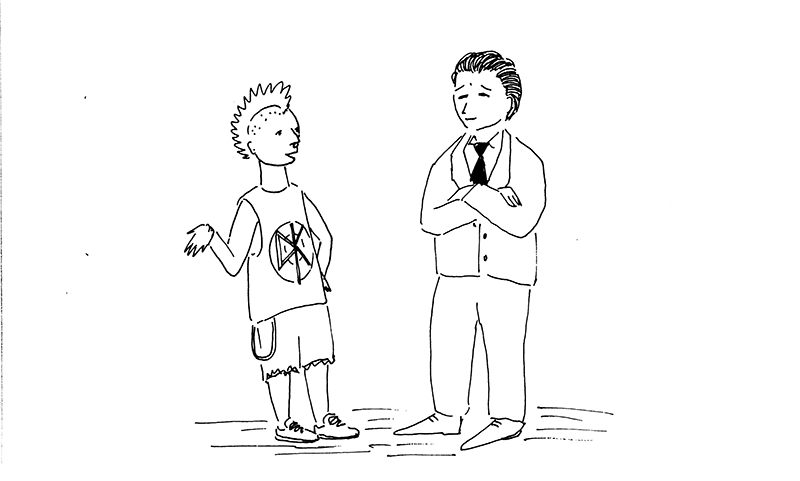Subversive Shrink: The Power of Subversive Dialogues
SLUGmag
Dear Subversive Shrink,
I have a family member who is quite patriarchal in an almost WASP sort of way, and I’m seeking to reevaluate how to respond to their expressions of their ideologies, with which I disagree. On one hand, many years ago, I was inspired when Jello Biafra advised to simply talk to somebody when they hold views that vary from one’s own to facilitate understanding of others’ perspectives. On the other hand, partly due to the atmospheric pressure to respect one’s elders, even slight challenges to their staunch views and (very) problematic political/religious/sociological statements fall to their reactive disregard for contrarian points as they flex their unilateral interpretation of their religion.
This person is older, and their views on how the world works or should work have been inculcated in their mind through their lifetime. It’s philosophically important for me to engage in a productive dialogue with people to offer a perspective that challenges the unilateral thinking of others. When the other party won’t listen, however, is it worth it to have these conversations that don’t necessarily have any bearing on the relationship between the two people? Should I let sleeping dogs lie? Or, should I offer points that challenge their views on individual topics and attempt to have a productive, mature conversation, regardless of how they react?
-Dialoguerre
Dear Dialoguerre,
It’s been a common misattribution that Voltaire stated, “I disapprove of what you say, but I will defend to the death your right to say it.” It was, in fact, biographer Evelyn Beatrice Hall who coined this phrase to encapsulate freedom of speech in her Voltaire biography. As infuriating as this assertion seems, it feels like it helps to manage the tension of being a practitioner of social justice in an oft unjust world. It does not, however, attend to the harm one absorbs when they defend (let alone tolerate) the problematic beliefs and statements of powerful others.
We are all subject to systems of power: Some of us carry heaps of privilege inside those systems, and some of us hold a little power here and there. In addition to our individual privilege identities, we are all steeped in the narrative of the system. One of the things I ask myself when tasked with connecting to someone who carriers a lot of power (and is wearing some dense blinders as a result) is, “How can I locate both my compassion and my confrontation?” In short, can we connect to each other from a space of kindness and empathy while simultaneously facing challenges to our individual value systems?
One of my guiding feminist authors and clinicians Laura S. Brown wrote about the power of “Subversive Dialogues” in the therapy space. I tend to think subversive dialogue belongs in every space. Without these conversations, we’d not have the sociocultural momentum to overcome the torpor of patriarchy. It helps to remember that sometimes, just setting forth the challenge is what matters, not the response you get. Think on a time when something or someone cracked the protective glass on your mind—it was alarming and disquieting, and it was the impetus for change. Perhaps you didn’t immediately respond with revelation and personal growth, and I bet that once you faced the discomfort, you found yourself shifting.
The next time you choose to—and remember, you have a choice—interact with this family member, check in with yourself first. Ask yourself if you feel you can engage in a subversive dialogue and take care of yourself. If not, you can choose to not engage. If you do choose to engage, then perhaps when the problematic, privileged perspective comes forth, ask the following questions: Where did they learn that, who had/has the power and who benefits? These are powerful, iconoclastic inquiries.
Lastly, provide some further reading for this person to engage with. Know that it is not your role or responsibility to educate them. Lay out the welcome mat for them to do their own work and raise their own consciousness. Keep at least one bookmark on your smartphone for an article deconstructing your top five social justice issues and share those links!
In Solidarity,
Subversive Shrink
